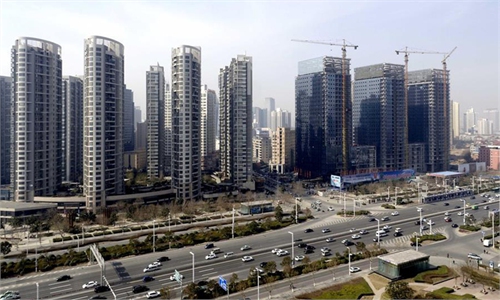
real estate Photo:Xinhua
China's top economic planner vowed on Thursday to ramp up efforts to spur private investment, so as to stabilize market expectations and investors' confidence, as the country strives to promote economic expansion without resorting to excessive liquidity growth.
Affected by the complex and volatile international situation and sporadic COVID-19 flare-ups at home, China's private investment rose 4.1 percent year-on-year in the first five months, slower than the country's fixed-asset investment growth of 6.2 percent over the same period.
However, private investment still accounted for over half of the total investment, or 56.9 percent, with the quality constantly improving, Meng Wei, spokesperson of the National Development and Reform Commission (NDRC), said at a press briefing on Thursday.
Private investment in the manufacturing and infrastructure sectors jumped 18.9 percent and 9.1 percent year-on-year, respectively.
The NDRC will effectively stimulate private investment with measures covering six aspects, including guiding the participation of private capital in key projects via models such as public-private partnership, encouraging the launch of real estate investment trusts for high-quality projects, and optimizing the business environment for private investment, according to Meng.
"Unlike government-led investment in key infrastructure and livelihood projects, private investors tend to engage in sectors conforming to market development trends. Thus, private investment better reflects the market vitality," Cong Yi, professor at the Tianjin University of Finance and Economics, told the Global Times on Thursday.
In addition to tax and fee cuts, stimulating private investment into small and medium-sized enterprises will effectively relieve the pressure and stabilize the job market, he said, noting that the move is likely to mobilize more stakeholders to increase investment.
Compared with the fallout of extreme high inflation in some developed economies, caused by their ultra-loose monetary policy in reviving their economies, China's use of existing private investment will have a slight impact on its monetary system, according to Cong.
An executive meeting of the State Council, the cabinet, on Wednesday urged for more reforms to spur private investment, proposing to select demonstration projects from the 102 major programs set out in the 14th Five-Year Plan (2021-25) to attract private investment.
In addition, the Wednesday meeting stated that approved transportation, water resources management, and other projects must be expedited, and private investment will receive equal treatment in bidding.
Bai Ming, deputy director of the international market research institute at the Chinese Academy of International Trade and Economic Cooperation, said that details are needed to boost private investment, as experience has shown that state-owned enterprises have an advantage over private companies, which is unfavorable to the expansion of private investment.
"In this regard, new measures proposed at the executive meeting, such as equal treatment in bidding and financial institutions' stepped-up support through refinancing, will effectively protect private investment," he told the Global Times.
In the first five months, the NDRC approved 48 fixed-asset investment projects, with combined investment totaling 654.2 billion yuan ($97.4 billion).
Meng said that the commission will work with other government agencies to accelerate new infrastructure construction, for example, boosting the integration of 5G, artificial intelligence and big data with the real economy.

